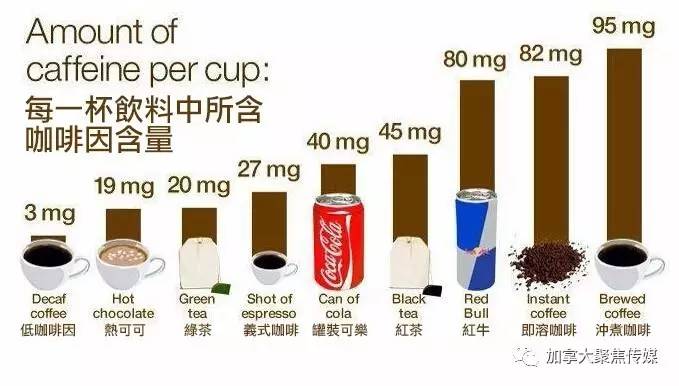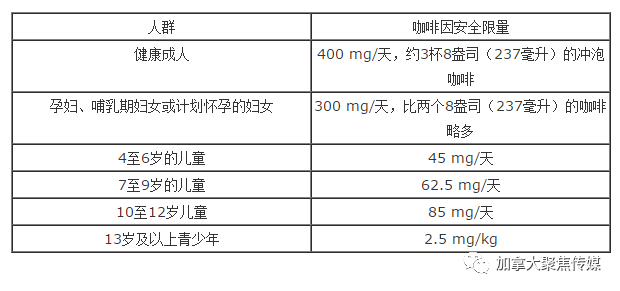Health Canada says safe caffeine intake can lead to sudden death
For professional baristas, please follow the coffee workshop (Wechat official account cafe_style)
Recently, a case of sudden death of arrhythmia caused by a 16-year-old who drank three caffeinated drinks within two hours in the United States has attracted public attention. Daily life is full of all kinds of caffeine drinks and foods. in addition to coffee, tea, energy drinks, some carbonated drinks and chocolates all contain caffeine. how much caffeine can people consume every day? so it won't be harmful to your health.
"

Health Canada issued recommendations on the safe level of caffeine consumption at the end of last month to ensure that Canadians can safely consume caffeine-containing products, according to Health Canada. But caffeinated drinks can be found everywhere, including carbonated drinks, energy drinks, chocolate, tea and coffee. It can either exist naturally or be added artificially.

In addition to drinks, caffeine can also be found in some health foods, such as small bottles of energy drinks (energy shots), and some over-the-counter cold and headache medicines. Consumers should read the product label carefully and take it according to the label instructions.
For most people, there is nothing wrong with consuming a small amount of caffeine, but eating too much can lead to insomnia, headaches, nervousness, excitement and other symptoms. The Ministry of Health says some people are particularly sensitive to caffeine and eating small amounts of caffeine can already show these symptoms.

How much is "excessive"?
The average adult should take no more than 400 milligrams a day. The largest Blonde Roast caffeine in a cup of Starbucks alone is 475mg, more than the daily intake of adults recommended by the Ministry of Health, while the medium cup contains 360mg. Other low caffeine levels at Starbucks include lattes, cappuccinos and Flat White, with a maximum of 195mg.

Who should pay special attention?

Pregnant woman
Women who are pregnant, breast-feeding and pregnant are not recommended to eat more than 300mg a day, which is equivalent to a large cup of Tim Hortons coffee.
Children
The older children are, the more likely they are to receive caffeine. Children between the ages of 4 and 6 should not consume more than 45 milligrams of caffeine a day, equivalent to less than half a cup of Tim Hortons coffee. Children between the ages of 7 and 9 can eat 62.5mg a day and less than half a cup of small Tim Hortons coffee. Children aged 10 to 12 can drink half a cup of small Tim Hortons coffee every day. Caffeine intake should not exceed 2.5 mg per kilogram of body weight for people over the age of 13. If a child weighs 40 kilograms, he can eat 40 milligrams and 2.5 milligrams (100 milligrams) of caffeine a day.

Healthy adults who do not consume caffeine regularly and women who are pregnant or breastfeeding tend to metabolize caffeine more slowly, and the response to caffeine is relatively longer than that of adults who regularly consume caffeine.
Energy drinks can affect heart health
Other ingredients in energy drinks may affect heart health, a new study has found. A survey by Canadian researchers shows that 76% of young people between the ages of 12 and 24 drink energy drinks, and 16% drink more than two cans a day. Health Canada recommends no more than two cans a day.

The Journal of the American Association of Cardiology published the results of a small study of 18 healthy adults who were asked to drink two cans of energy drinks sold on the market every day, while a control group drank only the same amount of caffeine. Drinks that contain no other ingredients. The researchers used electrocardiograms (ECG) to track changes in heart activity 24 hours after drinking a drink, including changes in QTc, a related indicator that causes arrhythmias and can be life-threatening. The small sample study showed that people who drank energy drinks had significantly higher levels of QTc than those who drank only caffeinated drinks.
Health Canada has warned that a variety of ingredients in energy drinks, such as taurine, L-ferritin and ginseng, can change heart rhythm. Professor Michelle Reid (Michael Rieder) of the University of Western Ontario in London, Canada, said: "if you drink a can of energy drink every day, it may not be a problem. But if you drink three or four cans, you must be careful. He advises parents and doctors to monitor the drinking of young people between the ages of 12 and 24, telling them how to reduce risk and how to be responsible for their health.
When combined with alcohol or other stimulants, energy drinks are more likely to trigger cardiovascular disease and need to be more cautious.
Important Notice :
前街咖啡 FrontStreet Coffee has moved to new addredd:
FrontStreet Coffee Address: 315,Donghua East Road,GuangZhou
Tel:020 38364473
- Prev

Myanmar plans to complete 200000 acres of coffee acres
According to Myanmar's Ministry of Agriculture, Animal Husbandry and Irrigation, 200000 acres of coffee will be planted in Myanmar between 2018 and 2020, and plans to produce 60, 000 tons of high-quality coffee by 2030. However, Myanmar still needs to formulate corresponding policies in order to expand the coffee planting area.
- Next

Sleepy in summer? Don't worry, this instant coffee cost-performance evaluation is for you
Professional barista communication Please pay attention to coffee workshop (Weixin Official Accounts cafe_style ) For some people who are addicted to work or study every day, how to ensure that they are full of energy every day is a question worth pondering. A thorn in my side? NONONO! Coffee is the answer; for nine-to-five office workers
Related
- The ceremony is full! Starbucks starts to cut the ribbon at a complimentary coffee station?!
- A whole Michelin meal?! Lucky launches the new "Small Butter Apple Crispy Latte"
- Three tips for adjusting espresso on rainy days! Quickly find the right water temperature, powder, and grinding ratio for espresso!
- How much hot water does it take to brew hanging ear coffee? How does it taste best? Can hot water from the water dispenser be used to make ear drip coffee?
- What grade does Jamaica Blue Mountain No. 1 coffee belong to and how to drink it better? What is the highest grade of Blue Mountain coffee for coffee aristocrats?
- What are the flavor characteristics of the world-famous coffee Blue Mountain No. 1 Golden Mantelin? What are the characteristics of deep-roasted bitter coffee?
- Can I make coffee a second time in an Italian hand-brewed mocha pot? Why can't coffee be brewed several times like tea leaves?
- Hand-brewed coffee flows with a knife and a tornado. How to brew it? What is the proportion of grinding water and water temperature divided into?
- What is the difference between Indonesian Sumatra Mantinin coffee and gold Mantinin? How to distinguish between real and fake golden Mantelin coffee?
- What does bypass mean in coffee? Why can hand-brewed coffee and water make it better?

